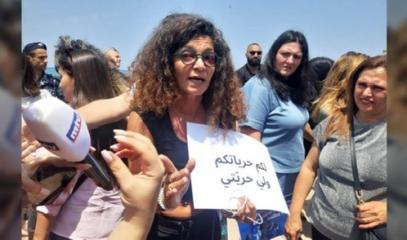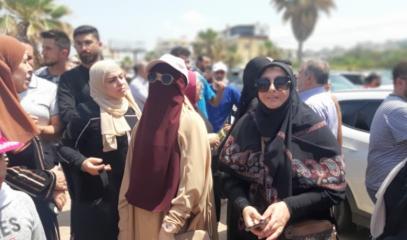Clash of the feminists and Islamists reflects larger Lebanese crisis
Women's bathing suits contested on a public beach in Saïda. A new battle in the radical Muslim world in the name of 'decorum' in fashion. The secular front recalls the principles of the Constitution and inviolable individual 'freedoms'.
Beirut (AsiaNews) - The Lebanese feminist groups have taken up a new battle over swimming costumes on public beaches, further mirroring a struggle within the Muslim world over clothing and costumes ranging from the hijab in Iran to "multi-coloured" clothes in Saudi Arabia.
Dozens of female activists demonstrated on 21 May in Saïda (40 km south of Beirut), a Sunni-majority town, to defend the wearing of swimming costumes on the public beach. The group was attacked by Islamic radicals, both men and women, who flocked to the seafront in large numbers to defend what they consider to be the 'good customs'. The presence of internal security forces and municipal police at the scene prevented the incident from escalating into open confrontation.
The feminist demonstration was a response to the attack on the public beach in Saïda last week against a woman in a swimming costume sitting on the seashore in the company of her husband. The troublemakers hurled water bottles filled with sand at the couple, eventually forcing them to leave the place in a hurry to prevent an escalation.
The incident prompted the president of the municipality, Mohammad Saoudi, to ban a demonstration planned for 20 May in support of the citizens' right to freely - and without constraints - enjoy the sandy beach and a counter-protest by radical groups.
The latter wanted to take to the streets to claim the fight 'in favour of modesty, virtue and against nudity'. However, the tensions and clashes that had been avoided on Saturday were punctually repeated the following day when dozens of people, mostly women, violated the regulations and gathered in front of the beach with placards and slogans 'in defence of freedom'.
The struggle between (Islamic) faith and freedom
these clashes and differing views point to a much broader issue concerning customs and freedoms, in Lebanon as in much of the Muslim world. Signs have been hung at the entrance to the seaside resort demanding 'decency in dress' for access.
At the same time, there are also other directives, such as the prohibition to bring in and consume alcoholic beverages as is traditionally the case on many western beaches where cocktails are sipped to the sound of music.
Nevertheless, returning to the Lebanese issue, how is it possible to identify and define such a vague notion as 'decency' on the beach, in a plural society where scales of values contradict each other?
During a press conference held on the seafront women's rights activist Joséphine Zgheib said " a woman simply wanted to exercise her right to go to the beach in the dress that suits her best. But Lebanese women, are victims of 'unjust laws and a patriarchal system that seeks to impose its protection on bodies and lives."
Asked about the affair, Marie-Claude Najem, former Lebanese Minister of Justice and university lecturer, emphasises that it is one of the collateral damages of the 'every man for himself' drift, otherwise known as 'federalism', which at this stage tempts the communities that make up society.
In her opinion, while the municipalities are charged with enforcing public order, it is the task of the central state 'to make individual freedoms prevail, and every effort in terms of conciliation must go in the direction of freedoms'. 'There is a central state that must make itself heard clearly and distinctly'.
Finally, the former minister warns against the phenomenon of 'freedoms in small doses'.
With regard to the prohibition of alcohol on the beach, the issue is more 'nuanced' and could be justified 'not so much on religious grounds, but because of the danger posed by broken glass to bathers'. However, he concludes, the call to 'remain vigilant' remains valid.
For political scientist Fadia Kiwan, director general of the Arab Women's Organisation, an institution operating under the aegis of the Arab League, radical Islamic currents do not have the right to impose their rules in the public space of a democratic state.
She herself deplores the issue and the ensuing controversy, seeing it as a threat to freedoms even though she considers Lebanon to be 'on the threshold of a promising season in terms of tourism'. Nevertheless, the expert wants to issue a warning against the formation of 'ghettos' based on community membership. "Without diversity, without the principle of accepting the other, the different, and respect for democratic freedoms, which have always been its strong points, Lebanon,' she adds, 'loses its raison d'être."
Sharia and the Constitution
Another critical voice, that of MP Marc Daou, who was present on the spot when the controversy flared up. 'The Lebanese Constitution,' he emphasises, 'is clear: it protects freedom of faith and expression.These public spaces are subject to the Constitution. We ask everyone to follow personal convictions, without imposing their views on others'.
"You have Jounieh [a famous seaside resort and tourist centre some 20 km north of Beirut], let us preserve Saïda,' some women covered in veils argued loudly during the demonstration. However, for Daou, 'the Lebanese have every right to go to public beaches dressed as they please. Freedom of expression and belief,' he added, 'is a right for everyone, and it is the same along all Lebanese coasts'.
For its part, the League of Local Ulemas denounced 'a suspicious and systematic media campaign targeting Saïda, its customs, its sheikhs and the population', while denying accusations of violence committed by religious leaders and their supporters against bathers.
For Salafist Sheikh Houssam al-Ilani, quoted in the press, the issue has transcended the boundaries of the controversy 'over swimming costumes, going so far as to challenge God'. "We do not accept, the presence of people who defy and provoke the city by drinking alcohol and denuding themselves on our beaches," thus violating the principles of sharia he retorted, closing the door to any mediation or dialogue.
GATEWAY TO THE EAST IS THE ASIANEWS NEWSLETTER DEDICATED TO MIDDLE EAST. WOULD YOU LIKE TO RECEIVE IT EVERY TUESDAY VIA E-MAIL? SUBSCRIBE TO THE NEWSLETTER HERE.










.png)










